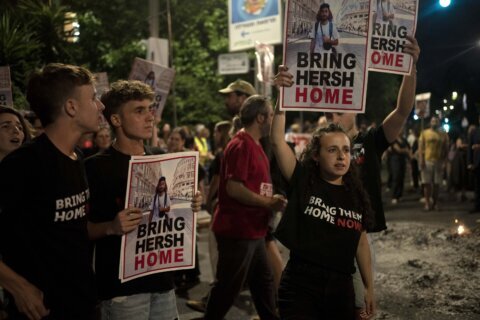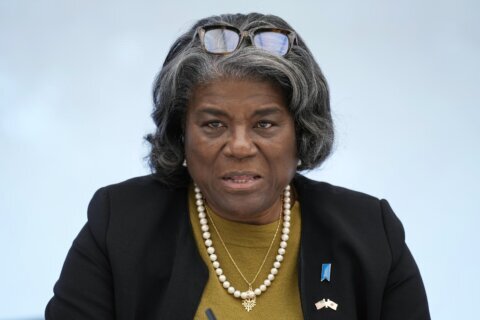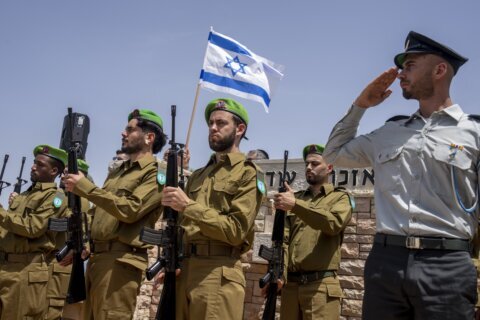THE HAGUE, Netherlands (AP) — A court set up in The Hague to prosecute crimes from Kosovo’s 1998-99 war for independence from Serbia opened its first trial Wednesday, with prosecutors saying they have irrefutable evidence that a former rebel commander is guilty of charges including murder and torture of suspected collaborators.
Salih Mustafa was arrested a year ago in Kosovo and sent to the Netherlands to stand trial at the European Union-backed Kosovo Specialist Chambers, a branch of the country’s legal system set up specifically to deal with allegations of war crimes committed as ethnic Albanian rebels united in the Kosovo Liberation Army fought a bloody conflict to break away from Serbia in 1998-99.
The lead prosecutor, American lawyer Jack Smith, stressed at the start of the trial that his team wasn’t targeting the KLA, Kosovo or its people or their struggle for independence, as he said opponents of the court claim.
“Nothing, nothing could be further from the truth,” he told the court.
Prosecutors plan to call 16 witnesses to support their case. The first is expected to testify next week. Defense lawyers didn’t make an opening statement Wednesday.
Mustafa is charged with the war crimes of arbitrary detention, cruel treatment, the torture of at least six people and the murder of one person at a detention compound in Zllash, Kosovo, in April 1999. He has pleaded not guilty to all charges.
The victims were accused by KLA fighters of collaborating with Serbs or not supporting the KLA, according to his indictment.
“To be accused of being a so-called collaborator during the war was grave, and often deadly,” prosecution lawyer Cezary Michalczuk said.
Mustafa wore a red T-shirt in court and listened to a simultaneous translation of proceedings through headphones that he held over his left ear.
He left the court after the prosecution’s opening statement, angering lawyers for victims.
“We do perceive this as a clear disregard and disrespect for victims,” attorney Anni Pues said.
The trial is the first to start at the Hague-based court that was established six years ago following a 2011 report by the Council of Europe, a human rights body, that included allegations that KLA fighters trafficked human organs taken from prisoners and killed Serbs and fellow ethnic Albanians they considered collaborators.
Pues said victims that she represents in court have been waiting more than two decades for accountability for crimes committed by KLA fighters, who are widely considered heroes in their home country.
“And they all hope to finally see some justice done,” she said. “None of the wounds inflicted in 1999 have healed.”
The court says that, so far, nine victims have registered to take part in the trial.
Among other former rebel commanders in custody awaiting trial are former Kosovo President Hashim Thaci, who resigned from office last year to defend himself against war crimes charges in The Hague.
Most of the people who died in the Kosovo war were ethnic Albanians. A 78-day NATO air campaign against Serbian troops ended the fighting.
Several Serbs have been prosecuted at a former U.N. war crimes tribunal for their roles in atrocities in the Kosovo war.
Smith said: “I can say with conviction that war crimes on one side do not justify war crimes on the other side.”
Mustafa is charged with personal involvement in arbitrary detention, cruel treatment and torture and with command responsibility for the murder. He also is charged with involvement in all four crimes as a member of a “joint criminal enterprise.” Michalczuk showed several photos of Mustafa dressed in military fatigues and a red beret.
He said that victims held at the detention center Mustafa ran were forced to sleep on the filthy floor of a barn and given insufficient food, water and medical treatment for injuries sustained in brutal beatings.
“We submit the evidence will leave no doubt whatsoever that these crimes occurred, and that the accused was responsible for them,” Michalczuk told the court.
Smith told judges that witnesses in Kosovo war crimes cases face “a climate of intimidation.”
He said the trials that will be held in the Hague courtroom are an opportunity “for Kosovo to put the issues of this war behind it once and for all, an opportunity for victims to have their voices heard and heard in a setting where they can speak the truth without fear of retribution or intimidation.”
Copyright © 2024 The Associated Press. All rights reserved. This material may not be published, broadcast, written or redistributed.







